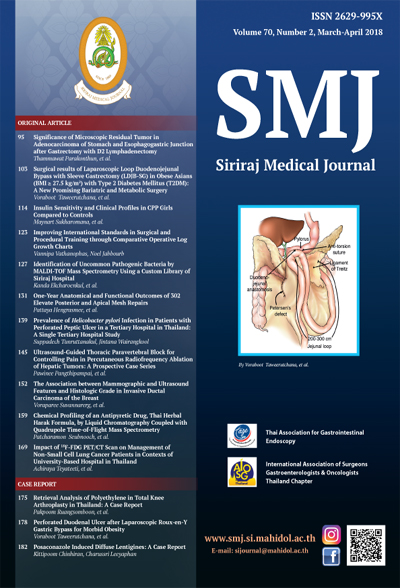Curcumin Attenuates Hydrogen Peroxide-Induced Cytotoxicity in Human Neuroblastoma SK-N-SH Cells
Keywords:
Curcumin; apoptosis; anti-oxidant; oxidative stress; SK-N-SH cellsAbstract
Objective: Cellular damage induced by oxidative stress has been involved in the development of neurodegeneration. Curcumin, a dietary polyphenol found in the rhizome of Curcuma longa, has been shown, both in vitro and in vivo,
to be an effective reactive oxygen scavenging molecule. We investigated an anti-oxidative effect of curcumin against .H2O2-induced toxicity in human neuroblastoma cell line SK-N-SH.
Methods: The SK-N-SH cells were pre-treated with curcumin 2 hours prior to H2O2 treatment. We measured cell viability, intracellular reactive oxygen species (ROS) levels, expression of apoptotic-related proteins and caspase-3
activity 24 hours post H2O2-induced cytoxicity.
Results: Treatment with curcumin at concentrations ranging from 5 to 50 μg/mL was not cytotoxic. Pre-treatment with curcumin at the concentrations of 5 to 50 μg/mL prior to H2O2 exposure caused a significant decrease in
intracellular ROS levels and a significant increase in cell viability in a dose-dependent manner. Expression of activated form of caspase-3 and BAX, a pro-apoptotic protein, measured by Western blotting were reduced when the SK-NSH
cell line was pre-incubated with curcumin. The curcumin pre-treated cells also exhibited less caspase-3 activity.
Conclusion: Curcumin has protective effects against H2O2-induced toxicity in a dose-dependent manner through its anti-apoptotic and anti-oxidative properties in an in vitro H2O2-treated SK-N-SH model.
Downloads
Published
How to Cite
Issue
Section
License
Authors who publish with this journal agree to the following conditions:
Copyright Transfer
In submitting a manuscript, the authors acknowledge that the work will become the copyrighted property of Siriraj Medical Journal upon publication.
License
Articles are licensed under a Creative Commons Attribution-NonCommercial-NoDerivatives 4.0 International License (CC BY-NC-ND 4.0). This license allows for the sharing of the work for non-commercial purposes with proper attribution to the authors and the journal. However, it does not permit modifications or the creation of derivative works.
Sharing and Access
Authors are encouraged to share their article on their personal or institutional websites and through other non-commercial platforms. Doing so can increase readership and citations.











